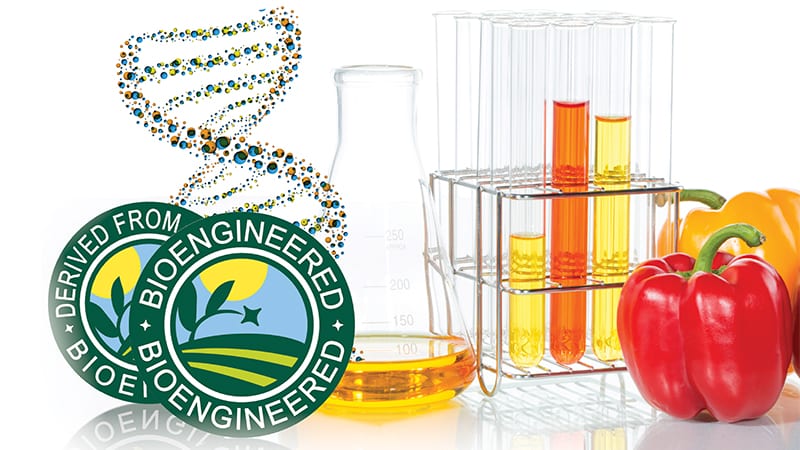Public Policy: PCC GE labeling 2.0
By Aimee Simpson
This article was originally published in January 2020

A little over a year ago, the U.S. Department of Agriculture released its long-awaited rule on the National Bioengineered Disclosure Standard. The rule was supposed to provide specific instructions on how to carry out the national law on mandatory, genetically engineered (GE) food labeling and bring better transparency to GE ingredients in our foods. The reality was not so clear.
As we discussed previously in the Sound Consumer, there are serious concerns with the law and rule. For starters, labels will not use the familiar terms “GE” or “GMO.” Instead, all labeling will use the term “bioengineered” or “BE.” It’s possible consumers won’t see even those vague terms; food manufacturers have the option to “disclose” the presence of “BE” materials through scannable QR codes or even call-in 1-800 numbers rather than clearly listing those ingredients on the package. Even more concerning are the many items that were left out of the disclosure requirements: highly-processed “BE” ingredients (termed “undetectable”), products from animals fed BE feed, and a long list of production methods that use the second wave of GE technology, such as gene editing and synthetic biology.
For a food co-op that had planned to implement our own GE labeling program, the gaps in the new BE rule are startling. Balancing our responsibilities under the new BE rule and the transparency we want to bring to our consumers, we started the process of talking with legal counsel, comparing and contrasting our intended disclosure program with our new legal obligations, talking with allies and industry experts, and looking for possible solutions to the conflict between the federal rule and our own goals.
The process was disappointing. We realized that from both a legal and operational perspective, it would not be possible to implement our own labeling program alongside the mandatory national program. This did not deter us, however, in identifying actions we could take to ensure as much transparency and as many GE-free options as possible. We are committed to:
Encouraging the strongest BE disclosures throughout our supply chain. Beginning in 2020 we will work with our vendors to encourage the clearest and most transparent steps each food manufacturer can take to meet the new BE disclosure standards. This means opting for on-package, text disclosures, voluntarily labeling highly processed products, labeling even an exempted producer, and ideally choosing Non-GMO Project Verified and USDA Certified Organic ingredients so that “BE” labeling isn’t necessary.
Emphasizing organic and non-GMO products on our shelves. The clearest answer in all of this was to avoid BE foods and continue to increase our emphasis on USDA Certified Organic and Non-GMO Project Verified products, especially on products where the BE rule creates unnecessary gaps in transparency like highly processed ingredients, animal products and GE 2.0. In other words, our goal is that we won’t need a label because no GE ingredients will be present to label.
Detecting the undetectable. Monitoring what food producers are choosing to label will be an important part of identifying our next policy steps and supporting efforts to improve transparency.
Continuing to advocate for transparency. PCC will continue to be a GE transparency advocate and support efforts to address the gaps and inconsistencies within the new rule.
Comply with the law and look for opportunities within the law to expand transparency. In addition to complying with the law, PCC will evaluate opportunities to provide additional transparency and clarity through voluntary labeling.
The official deadline for BE labeling is not until January 1, 2022. In the time leading up to that deadline, keep an eye out in the Sound Consumer and PCC Advocates for important updates as we continue to work toward the GE transparency that our customers deserve.
Aimee Simpson is PCC’s director of advocacy and product sustainability.
PCC in Olympia: A 2020 session snapshot
On Jan. 13, the state Legislature convenes at the capitol for 60 days to start another whirlwind legislative session and PCC will be there!
PCC’s legislative priorities reflect our triple bottom line and include important focus areas of supporting organic agriculture and farmland preservation, protecting marine ecosystems and advancing sustainable seafood production, and reducing plastics and toxins in our environment.
The Legislature operates on a two-year cycle, so bills from the 2019 session can be revived. From last year, we expect to see the plastic bag ban (HB 1205), food service products (HB 1632) and Paris greenhouse gas targets (HB 1113), or similar bills, again.
We also hope to see new bills that standardize food safety labels, support orca recovery, fund research and a statewide assessment of soil health, and create a grant program to support sustainable agriculture. PCC members have been invaluable in supporting past legislative priorities and creating change, and we welcome your continued collaboration. If you would like to receive occasional action alerts at critical times during the session, be sure to sign up for PCC Advocates!
